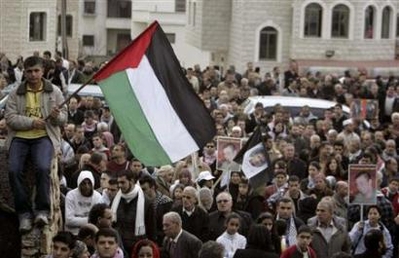Arabs say racism on rise as Israel turns 60
(Agencies)
Updated: 2008-05-08 11:22
Updated: 2008-05-08 11:22
SAKHNIN - Salwa Abu Jaber believes her story shows Israel discriminating against its Arab citizens, 60 years after the state was established as a haven for Jews.
 Israeli Arabs take part in a protest in the northern town of Sakhnin against a January Israeli court decision not to indict the alleged killers of 13 Israeli Arabs in October 2000, in this February 1, 2008 file picture. [Agencies]
|
The 32-year-old mother of four from northern Israel said her five-year-old daughter has never seen her father, who lives in the Israeli-occupied West Bank. Separated from the man for five years, she says she has been forced to divorce him.
Thousands of families have been similarly split by a 2003 ban on Palestinians in the West Bank from reuniting with their families inside Israel, imposed citing security reasons after the Palestinian uprising or intifada began in 2000.
"In practical terms, Israel forced the divorce on us," Abu Jaber said. "We could not continue to live like this any longer. If this is not racism, then what is it?"
This week, as Israel celebrates the anniversary of its foundation, its supreme court has said it found merit in the position of numerous petitions filed by rights groups against the law that keeps the families apart.
But Israeli Arabs -- those Palestinians who remained after hundreds of thousands fled or were expelled from their homes when Israel was created -- say institutionalized racism and illegal killings of Arabs have increased since the intifada started.
After 1948, about 120,000 stayed and were granted Israeli citizenship. Now about one in five Israelis is Arab, and many prefer to be called Palestinians like their kin outside Israel.
Israel denies it discriminates and touts its credentials as a multi-cultural democracy, arguing all citizens have the vote and are equal under the law. Arabic is an official language, alongside Hebrew.
Arabs say they also struggle to get jobs, housing and land.
"Arab citizens ... are related to more as enemies than as citizens with equal rights," the Association for Civil Rights in Israel (ACRI) said in its annual report.
The group said "racist incidents" against Arab citizens rose 26 percent in 2006. It did not have more recent figures. Poverty rates are four times higher among Israeli Arabs in comparison to Israeli Jews, according to Haifa-based advocacy group Mossawa.
Twelve Arab lawmakers including a cabinet member hold seats in Israel's 120-member parliament, but less than 8 percent of the country's civil service workforce is made up of Israeli Palestinians, according to a recent civil service report.
|
||
|
||
|
|
|
|

